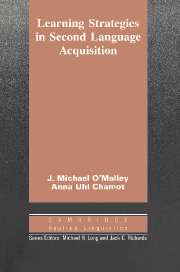Book contents
- Frontmatter
- Contents
- Series editors' preface
- Preface
- 1 Introduction
- 2 A cognitive theory of learning
- 3 How cognitive theory applies to second language acquisition
- 4 Learning strategies: methods and research
- 5 Strategies used by second language learners
- 6 Instruction in learning strategies
- 7 Learning strategies: models and materials
- 8 Summary and conclusions
- Glossary
- References
- Author index
- Subject index
6 - Instruction in learning strategies
Published online by Cambridge University Press: 05 October 2012
- Frontmatter
- Contents
- Series editors' preface
- Preface
- 1 Introduction
- 2 A cognitive theory of learning
- 3 How cognitive theory applies to second language acquisition
- 4 Learning strategies: methods and research
- 5 Strategies used by second language learners
- 6 Instruction in learning strategies
- 7 Learning strategies: models and materials
- 8 Summary and conclusions
- Glossary
- References
- Author index
- Subject index
Summary
Most learning strategy research in second language acquisition has concentrated on the identification, description, and classification of learning strategies used by second language learners. One of the principal concerns in this research has been the description of strategies used by more effective versus less effective language learners. Once strategies used by good language learners are identified and the strategy use of effective and less effective learners are compared, the questions arise of whether less effective learners can learn to use strategies to assist their learning and, if so, what strategies can and should be taught, and what instructional approach can be used to teach the strategies selected.
Instruction in learning strategies has been done with strategies that facilitate the acquisition of declarative knowledge (generally referred to as memory training) and of procedural knowledge (such as reading comprehension and problem solving). Considerable research on training learning strategies has been conducted outside the second language field in various areas of the curriculum, including reading comprehension, memory training (e.g., recall of vocabulary, facts, definitions), and problem solving. Noticeably absent from learning strategy training research in first language contexts is training in oral language production (Derry and Murphy 1986). Relatively little research has been completed on instruction in writing strategies compared to the substantial body of research on direct instruction in reading strategies (see, for example, Pearson and Dole 1987). Although much recent research interest in first language written composition has concentrated on identification of the writing process and analysis of discourse (Scardamalia and Bereiter 1986), some investigations of instruction in learning strategies for composition have been reported.
- Type
- Chapter
- Information
- Learning Strategies in Second Language Acquisition , pp. 151 - 186Publisher: Cambridge University PressPrint publication year: 1990
- 1
- Cited by



